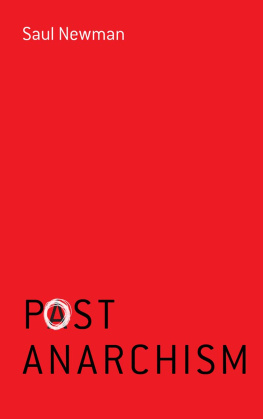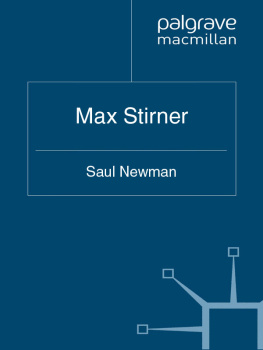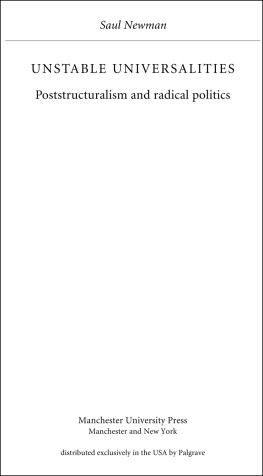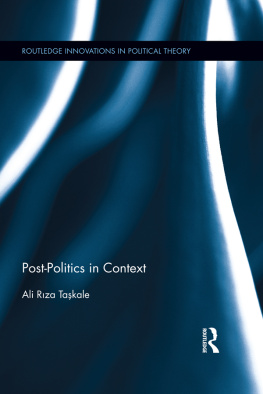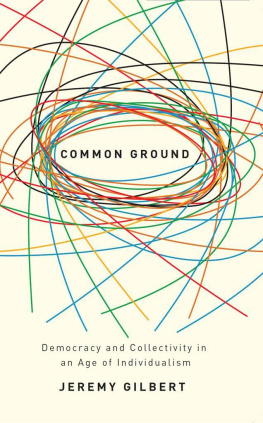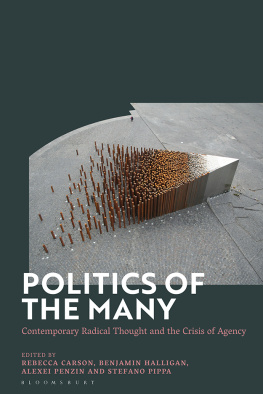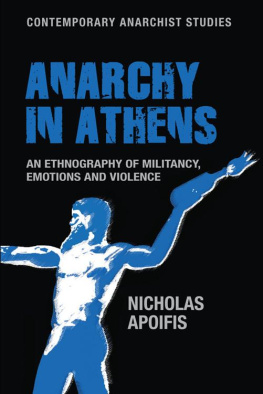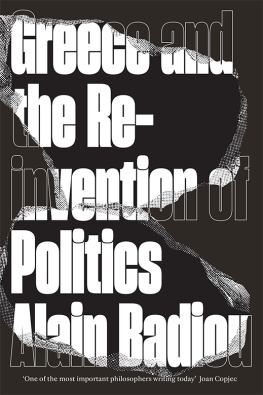Contents
Guide
Pages

Saul Newman
Postanarchism
polity
Copyright Saul Newman 2016
The right of Saul Newman to be identified as Author of this Work has been asserted in accordance with the UK Copyright, Designs and Patents Act 1988.
First published in 2016 by Polity Press
Polity Press
65 Bridge Street
Cambridge CB2 1UR, UK
Polity Press
350 Main Street
Malden, MA 02148, USA
All rights reserved. Except for the quotation of short passages for the purpose of criticism and review, no part of this publication may be reproduced, stored in a retrieval system, or transmitted, in any form or by any means, electronic, mechanical, photocopying, recording or otherwise, without the prior permission of the publisher.
ISBN-13: 978-0-7456-8877-0
A catalogue record for this book is available from the British Library.
Library of Congress Cataloging-in-Publication Data
Newman, Saul, 1972
Postanarchism / Saul Newman.
pages cm
Includes bibliographical references and index.
ISBN 978-0-7456-8873-2 (hardcover : alk. paper) -- ISBN 0-7456-8873-X (hardcover : alk. paper) -- ISBN 978-0-7456-8874-9 (pbk. : alk. paper) -- ISBN 0-7456-8874-8 (pbk. : alk. paper) 1. Anarchism--Philosophy. 2. Political science--Philosophy. I. Title.
HX833.N4976 2015
335.83--dc23
2015012745
The publisher has used its best endeavours to ensure that the URLs for external websites referred to in this book are correct and active at the time of going to press. However, the publisher has no responsibility for the websites and can make no guarantee that a site will remain live or that the content is or will remain appropriate.
Every effort has been made to trace all copyright holders, but if any have been inadvertently overlooked the publisher will be pleased to include any necessary credits in any subsequent reprint or edition.
For further information on Polity, visit our website: politybooks.com
Preface
What shape does radical politics take today? What sort of imaginary, which political and ethical horizon, animates contemporary struggles? What kinds of alternatives to our current political and economic order are being proposed and fought for?
Asking such questions usually elicits either cynical disdain or sighs of resignation. Everywhere the regime of neoliberal capitalism appears to have prevailed. Even in the wake of its most serious crisis since the Great Depression, when its catastrophic structure was laid bare for all to see, when it seemed to be at its weakest and most vulnerable, global finance capitalism, propped up with massive state support, was resurrected from its apparent demise and now takes on a strange new life. Perhaps this life is an afterlife, but afterlives have an unfortunate tendency to last a long time. Not only has the ongoing economic crisis not brought about the end of neoliberal capitalism, but it has proved merely grist to its mill, allowing, in the form of policies of austerity, even greater incursions of market rationality into everyday life and even more obscene levels of wealth accumulation by a global class of plutocrats. Our lives are increasingly dominated by the dictates of the market, by the imperatives of work, by the spectre of precariousness, poverty and debt. Yet, an inexplicable compulsion to continue as usual grips hold of us, and all the while we are haunted by the ever-present spectre of catastrophe. Alternative horizons seem obscure, almost impossible to imagine. Brief flickerings of resistance appear to have died down or been snuffed out. A great Nothingness engulfs the already exhausted political imagination an abyss which is in danger of being filled by new and violent forms of reactionary, populist and fascist mobilization.
So where do we look for signs of hope? Despite the apparent bleakness of the current moment, this book does not counsel pessimism or despair. Rather, its aim is to explore the contours of a new kind of political terrain, one that is opened up by the nihilism of the contemporary condition. I want to suggest that, notwithstanding the ambiguous and dangerous ground that we stand on and the seemingly insurmountable nature of the powers we confront, we are nevertheless witness to the emergence of a new paradigm of radical political thought and action, one that takes the form of an autonomous insurrection. Let me be bolder still and say that, if we turn our gaze away from the empty spectacle of sovereign politics, we can glimpse an alternative and dissenting world of political life and action which can only be described as anarchistic. By this I intend to convey the idea of a mode of politics in which self-government and free and spontaneous organization, rather than organization by and through the state, are central.
Autonomous political life
Exemplary of this autonomous form of politics, notwithstanding its relatively short-lived existence and ambiguous and uncertain future, would be the movements of Occupation that have appeared around the world in recent times. The unexpected gathering of ordinary people in squares and public places around the world from Tahrir Square, to Wall Street, to Gezi Park in Istanbul and the streets of Hong Kong embodies a wholly new form of political activity, in which the construction of autonomous, self-managed spaces and relations was more important than the presentation of specific demands and agendas to power. While these events took place in different political contexts, they were linked by the common claim of ordinary people to the right to political life in opposition to regimes and systems of power which denied this to them. In doing so, they rejected the usual channels of political communication and representation. The cry of the Indignants in the plazas of Spain was, You do not represent us! This has a double meaning that must be heard and properly understood: it is at once a cry of indignation against a political system that no longer represents the interests of ordinary people and a refusal of representation altogether, a refusal to be spoken for, interpreted (and inevitably betrayed) by politicians. It is as if the denizens of the square were saying, You do not represent us and you can never represent us! While this led many, on both the left and the right, to dismiss such movements as anti-political, incoherent and disorganized, such criticisms merely reflected an inability to come to terms with what is an alternative model of radical politics. Moreover, what was genuinely striking about such movements was their rejection of leadership structures and centralized forms of organization. Instead, their originality lay in the networked and rhizomatic forms of political life they engendered.
However, these events, glorious in their audacity, were only the most visible and striking symbols of a broader and more subterranean movement of resistance spreading spontaneously throughout the nerve centres of our contemporary societies. Here, for instance, we could speak of occupations in cyberspace from WikiLeaks to Anonymous in which anonymous networks are engaged in a form of information warfare with the state. We could point to mobilizations in support of undocumented migrants and against border policing and surveillance; to autonomous movements of indigenous people; to the dissenting world of climate camps, squats, social centres, alternative economies and ecological communities.
Such spaces, movements and practices, it seems to me, are post-statist. They open up a political terrain which is no longer organized by or directed towards sovereign state power and its representative institutions. The liberal democratic state has suffered a cataclysmic crisis of legitimacy its veils and garbs have been torn asunder, and the bailout of the banks and the repression of dissent have laid bare the ignominious truth of state power and the political elites which govern it. The state in contemporary liberal societies increasingly appears as a sort of empty shell, a vessel without life, a machine of domination and de-politicization which no longer even pretends to govern in the interest of all. Voting in democratic elections and participation in party politics comes increasingly to resemble an arcane religious rite performed by fewer and fewer people. While one may lament political apathy and cynicism, I prefer to speak to a kind of withdrawal from the political form of liberal democracy and the invention of alternative autonomous political spaces and practices, and even the possibility of new forms of political community. It is important to reflect on the way that the autonomous movements referred to above are not directed towards the state their demands are not addressed to it, nor do they seek to capture state power, in either a democratic or a revolutionary sense. The people who gather in the squares and public places of our metropolises look towards one another rather than towards the state. They embody the desire for autonomous and sustainable life which no longer bears the imprint of the state.

